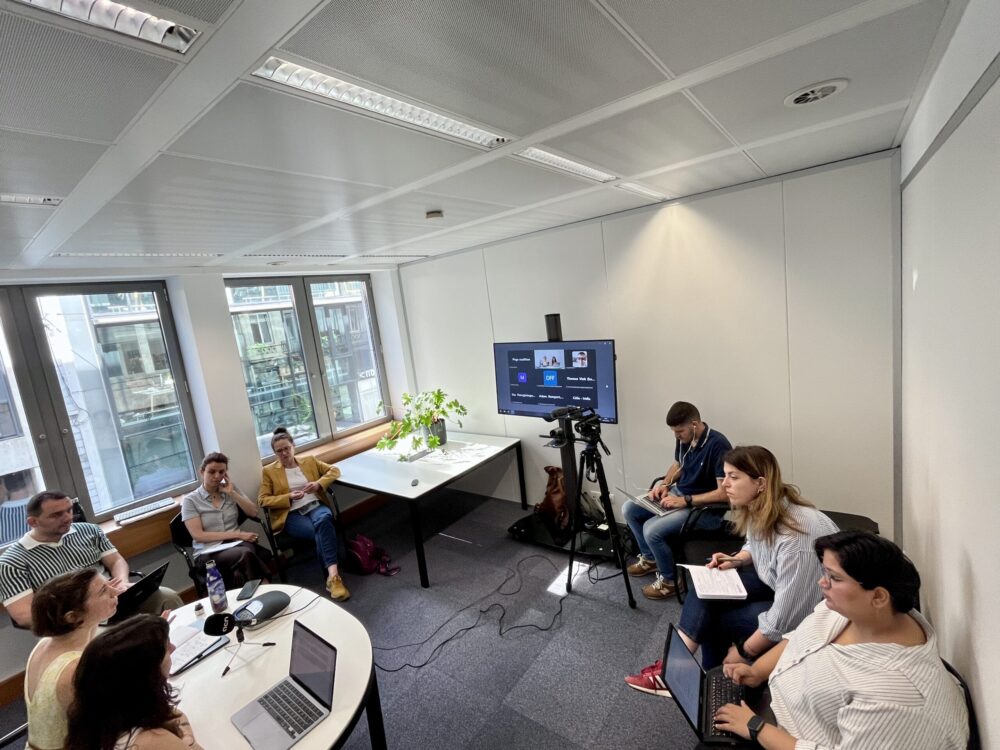The Launch of the PEGA Coalition

On Wednesday, 18 June at 10 a.m., seven organisations held a press conference at the EDRI Office (Rue Belliard 12, 1040 Etterbeek) to announce the launch of the PEGA Coalition. The event was attended by representatives of the two organisations coordinating the coalition (Data Rights and Irídia), as well as a representative of European Digital Rights (EDRi), that organised a webinar on spyware in the afternoon.
At the press conference, the two organisations presented the PEGA Coalition as a group that promotes and strengthens legal action against spyware in Europe. This includes human rights organisations from all EU member states and Serbia. There have been undercover cases of spyware being used to target journalists, lawyers, activists, political representatives, and human rights defenders. These organisations, which specialise in strategic litigation, have decided to join forces as they are involved in or planning legal action at the European and national levels in Germany, Greece, Hungary, Poland, Serbia, and Spain.
This alliance emerged in direct response to the failure of the European governments to act on the findings of the PEGA Committee. Despite the Committee’s clear and forceful conclusions in 2023, and its concrete recommendations to states under investigation, not a single government has taken meaningful steps to implement them. Furthermore, the obstacles and challenges associated with pursuing these cases at a national level have prompted them to organise and coordinate their efforts to combat spyware use in Europe. Although the national context differs from case to case, the organisations identified a common list of obstacles when it came to litigating against spyware. This was due to the lack of will and cooperation from the responsible states and companies, which made sharing strategies and information between cases particularly valuable.
Cèlia Carbonell, Irídia’s Civic Space Officer, has opened the press conference by sending a clear message: “Despite extensive investigations triggered by the Pegasus revelations, no victim has been compensated. No government has faced consequences. No meaningful safeguards have been implemented”. She has continued: “The PEGA Coalition is a direct response to the failure of European governments to act on the PEGA Committee’s findings. We will continue not only legal proceedings but also initiatives to expose spyware abuse, develop reporting tools, promote accountability, and empower civil society”.
As the proliferation of spyware has escalated, so too has its abuse by states undermining democracy, silencing dissent, and violating fundamental rights such as access to justice. The coalition has defined its creation as a direct response to this crisis. By placing government accountability for unlawful surveillance practices at the centre of its work, the PEGA Coalition has aimed to become the main point of reference and support for victims — leading the fight for transparency, justice, and the protection of human rights across Europe.
Lori Roussey, Director of Data Rights, has stated: “Spyware hacking tools make it easy to tamper with data, be it facts or evidence. It is fundamental to align law enforcement and intelligence agencies with proportionate democratic principles. Otherwise, we no longer live in democracies, and everyone’s safety online is exposed”. She added: “The European Commission is clear, it will not help targets. The PEGA coalition is therefore a means for us to take local cases and escalate the legal ladders to bring spyware to top European courts. This is an issue across Europe, it is European. The best way forward now is litigation and the pooling of resources to build a unified front”. Roussey concluded by pointing out that the PEGA coalition will seek to reinforce members’ advocacy through litigated cases, while aiming to develop technology neutral arguments in order for our work to be future-proof. “Hacking, like biometrics and AI, is a dual use technology. Dual use technologies —that is to say technologies that have potent civilian uses and that can easily be switched to serve the military, at scale—. Such technologies can therefore easily be turned against the population, as we see with spyware”. More information on dual use technologies, here.
The coalition’s presentation has been accompanied by the launch of a website designed to serve as a resource for organisations and victims of spyware. Starting today, the PEGA Coalition has taken action beyond legal proceedings. It has focused on exposing spyware abuses, developing reporting tools, promoting accountability, prevention, and remedies, as well as empowering civil society, sparking public debate, and helping restore the rule of law.
In support of the press conference, EDRi Policy Advisor Aljoša Ajanović has reinforced the need for such a coalition: “The reality is quite different — both the Commission and Member States have been inactive, and spyware has not been treated as a priority, effectively allowing its continued use. In this context, strategic litigation will be fundamental”. He continued: “The EU’s inaction has become a blueprint for other governments to act with impunity. It sends the message that surveillance abuses come with no consequences”. Ajanović pointed to the situation in Serbia as a concrete example: “After SHARE Foundation — a Belgrade-based digital rights organisation and member of this coalition — helped unveil the use of spyware by Serbian authorities against activists and journalists, it has come under a fierce smear campaign. The government and its proxies now accuse them of being ‘an existential threat to national sovereignty’ simply for exposing illegal state surveillance”.
Also present in the room has been Sophie in ’t Veld, former rapporteur for the PEGA Committee, who has declared: “There has been no action at all. There is zero incentive from Member States, even though we all know what the solutions are. We must make it unavoidable for them to take action — through litigation and public communication”.
